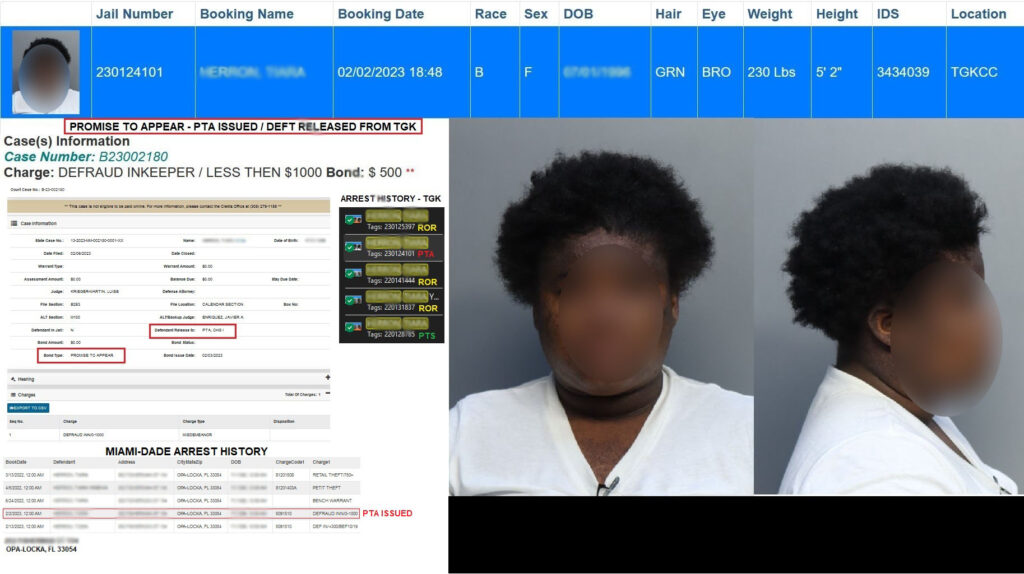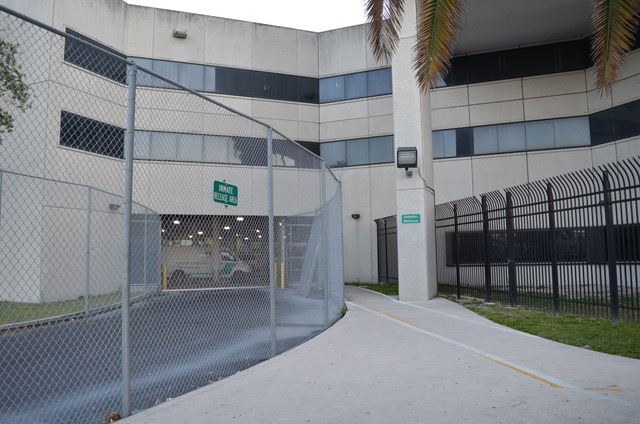Adding insult to injury for law-abiding taxpayers in Miami-Dade, our ongoing investigation into the unauthorized PTA program reveals that it’s not the sole questionable release initiative that has been discreetly put into action. This leads us to scrutinize the initial courtroom proceedings overseen primarily by Judge Mindy Glazer and various backup judges. These proceedings, commonly referred to as “bond hearings,” are mandated by Florida Statutes to occur within 24 hours of an arrest, provided the defendant remains in custody. After meticulously reviewing numerous public records and videos of these hearings, it becomes apparent that Miami-Dade is gradually undergoing a transformation into a de facto zero bail jurisdiction. The subtle adjustments being made behind the scenes to a system that has historically served Miami-Dade taxpayers effectively are gradually eroding the foundation of law enforcement and accountability that upholds the safety of our community. Despite being open to the public, these hearings seldom attract an audience, allowing for the Florida Statutes concerning the pretrial release of defendants to be conveniently disregarded, given cursory attention, or, as we will illustrate, blatantly violated by these first appearance judges.
Lynn Strelioff – Charged with Fugitive Warrant from Las Vegas, NV
Upon her return to the United States, Lynn Streiloff was apprehended by US Customs due to an active fugitive from justice warrant issued in Las Vegas, NV. The hearing, presided over by Judge Glazer, commences with a giddy comment directed at the defendant: “You have a warrant from Las Vegas, my favorite place,” she exclaims in an excited manner. However, from that point onwards, the proceedings take a downward trajectory with regard to upholding law and order.
The first indication that the situation is deviating from the norm occurs when Judge Glazer inquires of the prosecutor ASA Eileen Keely, “Miss Keely, can I do what Judge Cardonne does sometimes” (09:28:08). The prosecutor responds with the State’s objection. This prompts curiosity about Judge Cardonne’s actions that the State finds objectionable. Although we are currently investigating this matter, it is highly likely that the events in the current case mirror what Judge Cardonne has done.
Following a series of exchanges and objections raised by the prosecutor, Judge Glazer grants the defendant a release on her own recognizance (ROR), akin to a pinky promise, while sternly warning her to surrender to Las Vegas authorities. It is important to note that Judge Glazer issues this dubious release despite acknowledging, “I’m not supposed to, but I will” (09:29:28). As a Judge, she is acutely aware that this decision contradicts Florida Statutes, legislative intent, and the interstate compact for extraditions.
Section 941.16 of the Florida Statutes outlines the conditions under which bail can be granted, specifying that unless the charged offense is punishable by death or life imprisonment in the state where it was committed, a judge or equivalent judicial authority in this state may permit the arrested individual to post bail with appropriate sureties, in an amount deemed suitable, contingent on the individual’s appearance before the judge at a specified time and their readiness to surrender upon the state Governor’s warrant.
The ensuing outcomes, predictable to all except perhaps the Judge, reveal a circumvention of the Florida Statutes. This maneuver not only results in financial burdens for taxpayers due to additional hearings and two case resets but also places extra workload on the prosecutor. Most significantly, it undermines the credibility of the legal system and impairs the public’s perception of law and order. Undoubtedly, this sets a troublesome precedent.
This serves as merely a singular instance among the examples unearthed during our ongoing investigation. We are delving into the historical records of Judge Cardonne’s case dockets to shed light on the context of the preceding remarks.
IEISHIA ELLIS – Charged with Burglary/Occupied Conveyance, Petit Theft
Ieisha Ellis was arrested by Miami Beach Police and charged with Burglary of an occupied conveyance and Petit theft. The bond for these charges is $8,000.00, this is determined by a standard bond schedule that factors in the gravity of the allegations. The hearing begins with Judge Mindy Glazer outlining the charges and noting Ellis lives in Illinois. The assistant State attorney then informs Judge Glazer that a bond is being requested due to Ellis’ lack of local ties within the community.
Subsequently, Judge Glazer summarily slashes the bond from $8,000.00 to a mere $1,001.00. Inquiring of Ellis whether she possesses the funds to post the bond, Ellis confirms with “Yes, I have around $1,000.00” (13:51:43). Thus far, the outcome is a conspicuously low bond set by the Judge for an out-of-state visitor accused of a crime against an actual victim. Yet, the story doesn’t end here.
Judge Glazer continues by suggesting that Ellis could be released on her own recognizance (ROR), incredibly prompting the prosecutor to explain the purpose of a bond in this specific case to the seasoned Judge, who primarily handles first appearance calendars (13:51:59). Nevertheless, Judge Glazer offers a simple solution: if Ellis fails to appear, she’ll just issue a warrant, and Ellis will be apprehended and brought back for legal proceedings. Consequently, she ultimately releases Ellis without imposing a bond, despite the assistant State attorney’s objection (13:52:59).
In her justification for this decision, Judge Glazer appears to assume that issuing a warrant possesses some sort of magical power that can instantly locate, arrest, and transport an out-of-state defendant over a distance of approximately 1200 miles. However, extraditing an individual from another state incurs costs ultimately borne by hardworking taxpayers of Miami-Dade. This process involves orchestrating the arrest in another state – no easy feat – filing paperwork through the overburdened State attorney’s office, navigating the case through Illinois courts, and finally, arranging for two Miami-Dade Police detectives to travel to Illinois and physically transport the defendant back.
The expenses rapidly accumulate, encompassing law enforcement hours, State attorney hours, airfare, rental vehicles, and various other expenses. Regrettably, Judge Glazer seems to overlook these considerable costs, releasing an out-of-state offender without repercussions for her actions or consideration for the victim. This scenario underscores another instance of the absence of seriousness and adherence to a system that has historically succeeded in preserving the safety and accountability of our community. The charges against Ieisha Ellis were eventually dismissed.
Ashley Lobato – Charged with
COCAINE/ POSSESSION Bond: $ 5000
COCAINE/ POSSESSION WITH A FIREARM Bond: $ 7500
CANNABIS/ SELL/ MAN/ DEL/ POSS W/ INTENT/ ARMED Bond: $ 7500
CANNABIS/ POSSESS/ MORE THAN 20 GR/ ARMED Bond: $ 7500
CONCEALED FIREARM/ CARRYING Bond: $ 5000
FIREARM/ USE, DISPLAY WHILE COMMITTING A FELONY Bond: $ 7500
PRESCR OR NEW DRUG/ POSSESS W/ O PRESCRIPTION Bond: $ 500
DRUG PARAPHERNALIA/ POSSESS W/ INTENT TO USE Bond: $ 1000
Warrant Case: TO BE SET Desc: HOLD FOR MAGISTRATE
Ashley Lobato found herself in police custody after being arrested and charged with numerous drug and firearm-related offenses. The arresting officer(s) considered the charges serious enough to necessitate a magistrate hold, preventing the defendant from posting bonds until her initial appearance hearing. Fortunately for her, she appeared in Judge Mindy Glazer’s courtroom, which is often associated with lenient outcomes for the defendants.
As is customary, the hearing unfolds with Judge Glazer reading the extensive list of severe charges. She promptly inquires of the assistant State attorney whether she would object to a Pretrial Services release. Pretrial Services is a taxpayer funded initiative tailored for financially disadvantaged defendants accused of minor offenses. The prosecutor vehemently objects, emphasizing the gravity of the charges by citing details from the arrest affidavit, and requesting either a bond or house arrest (13:22:01).
Despite the prosecutor’s arguments, Judge Glazer persists in advocating for the defendant, downplaying Lobato’s involvement and speculating that she might not have been engaged in drug sales but was merely a passenger. The prosecutor once again directs attention to the presence of illicit substances and bundled cash discovered in Lobato’s possession and highlights her statement to the police about carrying the gun in her purse to protect her boyfriend during drug deals. However, these points appear to fall on deaf ears.
Judge Glazer proceeds to order Lobato’s release to Pretrial Services while offering a reprimand to find a better boyfriend. Consequently, the taxpayers of Miami-Dade bear the financial responsibility for an individual facing serious charges, despite her evident lack of financial need. In the end, the defendant walks away without facing consequences for her actions. Additionally, this situation underscores a disregard for the efforts of the arresting officers and prosecutors, who work tirelessly to maintain the safety of law-abiding citizens in Miami-Dade.
Following the various speculations and remarks voiced during the hearing, placing blame on the co-defendant Donavyne Duran as the mastermind, one might anticipate that he would face stern measures from Judge Glazer when his case was called. However, this presumption is soon discarded. Without a clear rationale, Judge Glazer quickly reduces his bond from the established standard amount of $37,500 to $11,002.00, even assigning nominal one-dollar bonds to certain charges. Once more, this instance underscores the deficiency in accountability within these proceedings.
Chloe Thompson – Charged with armed trafficking in MDMA
Chloe Thompson was arrested by Miami-Dade Police and charged with armed trafficking in MDMA. This is a serious offense that normally doesn’t allow an immediate bond but is determined by a judge at a later point. Typically, this bond is established by the division judge after a formal motion and hearing as the case progresses. Representing Ms. Thompson, a private attorney presents her case and advocates for a bond. Following deliberations between this attorney and the prosecutor, an agreement is reached: a $50,000.00 bond, contingent on funds being posted by Ms. Thompson’s mother, who is present in court.
Judge Glazer proceeds to read through the arrest affidavit, confirming probable cause for trafficking in MDMA. She informs Ms. Thompson that the charges could result in a mandatory minimum sentence of three years (09:39:53). Momentarily, Judge Glazer is heard conversing off-camera about the bond and casually commenting on the defendant’s outlook. Quickly refocusing, she returns to the matter at hand and dramatically reduces the agreed-upon $50,000.00 bond to a mere $5,000.00, disregarding the prosecutor’s strong objections.
However, Judge Glazer’s actions don’t conclude here. She then queries the prosecutor on her stance regarding a pretrial services release (09:39:05). Despite the prosecutor’s firm refusal and subsequent explanation to the experienced Judge about the necessity of a bond for these serious charges, Judge Glazer persists. In an unusual twist, she appears to converse with the defense counsel while commending him for presenting a persuasive argument, despite her own introduction of the idea of Pretrial Services (09:39:58). Ultimately, she orders the release of the defendant through taxpayer-funded Pretrial Services, a program intended for indigent defendants charged with minor offenses.
Fortunately for Ms. Thompson, she had two advocates working on her behalf that day: her private counsel and Judge Glazer.
Tiarra Heron – Charged with defrauding an innkeeper
Tiarra Herron was arrested and faced charges of defrauding an innkeeper. It’s crucial to note that this defendant had encountered the same charge just six days prior and had been released through the covert operation of the questionable PTA release pilot program operated by Miami-Dade pretrial services. Her prior case is detailed here.
The court session commences with Judge Robin Faber making light-hearted comments about the charge, which sets a tone that persists throughout the proceedings, portraying the defendant as a victim. Judge Faber proceeds to mention that Herron had been arrested for the same charge and subsequently released a mere six days earlier. However, this doesn’t seem to influence his decision, as he promptly orders her release on her own recognizance (ROR).
Throughout the hearing, Judge Faber continues to verbally coddle the defendant, at one point even implying that her alleged theft was motivated by necessity for sustenance (13:15:21). He continues by scheduling both pending cases for the same court date and providing oral notice to the defendant. Consistent with previous hearings, there appears to be minimal consideration for any victims in this case, particularly a small business suffering real losses due to these crimes. Almost as an afterthought, Judge Faber briefly remarks to Herron “Oh, and don’t go to the Starlite Cafe” after she has departed from the hearing(13:06:09). Thus, the purported victim in this case isn’t even granted the protection of a stay-away order for the alleged repeat offender by Judge Faber. It’s puzzling how such a meticulous judge could overlook the fact that Herron is not at all unfamiliar with the criminal justice system.
As anticipated, Ms. Herron failed to appear for both court cases, resulting in two active bench warrants as of the publication date.

Natalie Oudin – Charged with Bench Warrant
Natalie Oudin was taken into custody due to a bench warrant issued for her failure to appear. Judge Julie Nelson had issued this warrant on May 2, 2023, when Oudin failed to appear in court to answer a charge related to P/P Abutting water, which constitutes a criminal offense under a municipal ordinance. The proceedings are initiated with Judge Robin Faber informing Oudin of her arrest on account of the bench warrant. After encountering some technical glitches, Judge Faber becomes noticeably agitated by the nature of the charged offense. Instead of seeking an explanation for Oudin’s failure to appear, he proceeds to criticize the validity of the ordinance, going as far as referring to it as “a pathetic little case” (09:35:34), suggesting that the defendant shouldn’t have been arrested in the first place. Judge Faber then proceeds to dismiss the case with evident annoyance, exercising his own discretion.
It’s noteworthy that the legislative intent behind this ordinance is to safeguard the public, particularly visiting tourists, from powered watercraft as they enjoy the beaches and shores of Miami-Dade. Once again, the Police, who enforce these regulations to ensure public safety, find their efforts undermined by the viewpoint of a first appearance Judge who might lack adequate information or perhaps doesn’t share an appreciation for outdoor activities.
Hon. Nushin G. Sayfie – Chief Judge, 11th Judicial Circuit

The Honorable Judge Nushin Sayfie currently holds the position of Chief Judge for the 11th Judicial Circuit. Since 2021, Judge Sayfie has fulfilled this role, which encompasses responsibilities such as issuing administrative orders governing court operations and implementing programs and policies that impact the booking and release procedures for alleged offenders. However, Judge Sayfie’s actions have led to suspicions about her true intentions, despite her apparent stance in favor of established law and order.
For instance, in January 2023, it came to light that Judge Sayfie, along with other like-minded individuals, had been working covertly on the implementation of an algorithmic assessment known as the “Public Assessment Tool” (PSA) by the Arnold Foundation. This is a similar approach that has been adopted in other jurisdictions with disastrous results. An article published by The Miami Herald on January 22, 2023, titled ” Bail system hurts Miami’s poor. Controversial software could fix that but is public at risk? “ the author David Ovalle quotes Judge Sayfie:
“We are giving it our incredibly best shot,” Sayfie said. “But we recognize that a few months in, we might see that, ‘Wow, we’re keeping way too many people in.’ We recognize in perpetuity we’re going to be going back to the drawing board and modifying the PSA and modifying our practices to make sure that we are constantly keeping the public as safe as we can keep them and making sure we’re not incarcerating people unjustly.”
So in essence this proposal was a done deal, hatched behind closed doors and clearly not in the best interest of the law abiding public or safety of the taxpayers. For example, jurisdictions that have implemented this utopian algorithm model include, Cook County, Ill (Chicago), Harris County,TX(Houston), Milwaukee, WI and San Francisco, California. Not exactly the cities one would visit for a tour in public safety or law and order.
This disastrous experiment was nearly unleashed on an unsuspecting public, but was thankfully derailed by Governor Ron DeSantis visit to South Florida and subsequent press conference where he strongly voiced his opinion in regards to this dangerous proposal. The plan was immediately put on hold. In subsequent weeks Judge Sayfie did a series of face saving interviews where she laughably attempted to compare her proposed perilous adventure in public safety as being in line with Gov. Ron DeSantis concrete law and order initiative.
Another point of concern is the contentious PTA (Promise to Appear) release scheme. While referred to as a pilot program, its origins remain elusive. According to the Florida Rules of Criminal Procedure:
3.125(j) Rules and Regulations. Rules and regulations of procedure governing the exercise of authority to issue notices to appear shall be established by the chief judge of the circuit.
As of the publication date, no administrative order has been found addressing this “Pilot Program.” Our investigation into this questionable release scheme indicates that it likely commenced in 2021, the same year Judge Sayfie assumed her role as Chief Judge. Notably, no official has stepped forward to take credit for this so-called Pilot Program, yet it continues unabated.
Upon reviewing public records, it becomes apparent that despite the covert Bail Reform plan being thwarted by Governor DeSantis, it is still being gradually implemented albeit at a slower pace. A Chief Judge could potentially enact policy changes related to Pretrial Services, Release on Recognizance (ROR), and extreme bond reductions (e.g., one-dollar bonds) without leaving an extensive paper trail. For instance, informal interactions such as fleeting elevator conversations or subtle agreements could facilitate such changes. It is incumbent upon us, the taxpayers and the ultimate victims of these social experiments, to hold our elected officials accountable.
